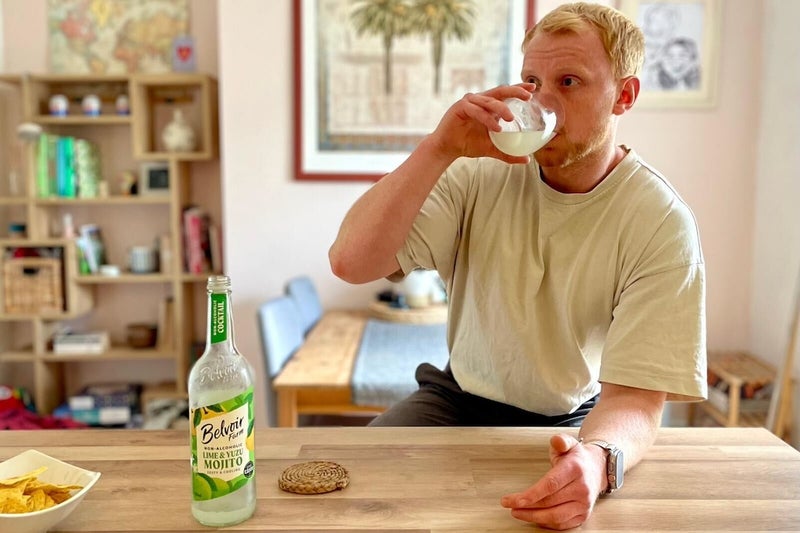It's seven o'clock and, like millions of other hard-working women, I feel relief as I pour a glass of chilled Sauvignon. It's been a tough day, and I know the wine will switch my brain from 'stressful afternoon' to 'relaxed evening' mode. But with every sip, my guilt mushrooms. I'm not anywhere close to being an alcoholic; two glasses is my limit, after which I'll switch to sparkling water. I don't drink spirits. And I haven't been properly drunk since 2014.
![[Flic describes herself as someone with a 'tendency to anxiety' and says she loved the way alcohol switched off the running commentary in her head]](https://i.dailymail.co.uk/1s/2025/02/14/01/95185879-14394767-Flic_describes_herself_as_someone_with_a_tendency_to_anxiety_and-a-186_1739497921035.jpg)
So what's the problem? Well, in January 2018, I stopped drinking altogether, and until last summer I thought I'd never touch a drop again. I was convinced I could withstand the constant, subtle social pressure of seeing it around me – even my husband's unapologetic enjoyment of wine. After all, I'd felt far healthier without it and had got used to the occasional boredom of sobriety. I slept better, my skin was brighter, I figured I might even live a bit longer.
But in the end, the siren call proved too strong. Flic Everett says drink was a fundamental part of her generation's formative years - unlike young people these days. And I'm angry with myself. When I gave up smoking 25 years ago, I never regretted it for a second and haven't been tempted since. So, given I've never been addicted to alcohol, why did I – like so many other take-it-or-leave-it drinkers – return to it?.
Everyone now agrees smoking is a terrible idea. The few who do carry on puffing into middle age find themselves alone on a draughty doorstep. With alcohol however, despite the equally well-documented health risks, the opposite applies. non-drinkers are the ones who stand out, confronted by cheery friends urging you to have 'just a small one'. I am a card-carrying member of Gen X. In 1985, aged 15, I was introduced by school friends to the illicit joys of martini and lemonade and swiftly moved onto Malibu and pineapple.
By the time I was of legal drinking age, I was a veteran of those 1980s favourites, Taboo and Midori. Drink was a fundamental part of my generation's formative years – unlike young people these days. A survey by The Times this week found that just 33 per cent of young people regularly binge drink, compared with 84 per cent 20 years ago. This certainly applied to me. At university I moved on to alarmingly cheap Bulgarian wines, and later, in the dinner party years of my 30s, I developed a very Noughties love of Prosecco.
As someone with a tendency to anxiety, I loved the way alcohol switched off the running commentary in my head. Flic describes herself as someone with a 'tendency to anxiety' and says she loved the way alcohol switched off the running commentary in her head. Yet I seldom got so drunk I made a fool of myself, or suffered a hangover that couldn't be fixed with a hot shower and a fried breakfast. So I thought little of any health issues I might be storing up for the future. In short, I saw no reason to quit.
Then in my mid-40s, as perimenopause hit me hard, I started to notice that whenever I had a glass of wine, my face would flush crimson. I'd feel heat racing over my skin, and the hangover symptoms would begin before I'd reached the bottom of the first glass. After a few months of suffering like this, I decided to quit for a month. I read This Naked Mind by Annie Grace, a book that cuts straight to the heart of why we drink – to self-soothe, to hide anxiety, to join in with everyone else – and it convinced me I was doing the right thing.
A few weeks in I realised I wasn't missing it, and felt well for the first time in months. So I decided to continue. After two years, I even wrote a book called How To Be Sober And Keep Your Friends. Yet, clearly, alcohol had not lost its grip on me entirely. A year ago, after six years teetotal, I read about 'histamine allergy' and realised it was describing my symptoms after drinking wine. Apparently it could worsen with menopause.
I'd been working hard on a novel, and was worn out. I was beginning to miss the soothing caress of booze after a hard day. I knew I could power through without it... but maybe I didn't have to?. I decided to test it out and took an over-the-counter antihistamine before a few sips of wine. I drank half a glass – and my face remained unflushed. There were no hangover-like symptoms and the familiar sense of relaxation washed over me. I'd finally cracked it.
A few weeks later, we threw a dinner party. I knew everyone would be enjoying a glass of fizz so I took the anti-histamine a couple of hours before and, to their surprise, joined our guests. I began to recall why I'd enjoyed drinking in the first place. It was convivial, a shared pleasure. Though I have largely stuck to my strict two-drink limit, by last summer I was back to drinking several nights a week. I've even found myself looking forward to unscrewing the cap.































